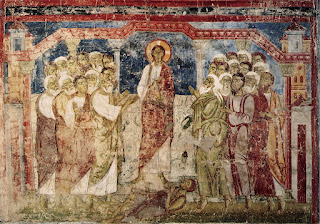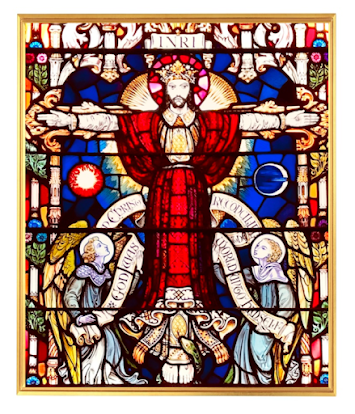Sermon on the Good Shepherd
Ancient
shepherds were pretty bad-ass, when you think about it, even though they held a
very low status in society. Imagine being all by yourself with a hundred head
of pretty foolish livestock to protect.
Imagine you don’t have a gun, just a rod and a staff—basically a couple of big
sticks—and your flock is in constant danger from wolves, and lions, and
rustlers who try to jump the portable fence you’ve put up for the night.
Imagine there’s no closing gate to this temporary enclosure, just you with your
two sticks, sleeping in the opening, so anything coming to trouble the sheep
will have to go through you.
And then when
day comes, your job is to call each sheep by its name—and every one of them has
a name—and lead them all to good pasture, walking in front, where you’re the
first to face any hazard.
Very truly, I tell you, I am the gate
for the sheep. All who came before me are thieves and bandits, but
the sheep did not listen to them. I am the gate.
When Jesus
calls himself the Good Shepherd in this very poetic chapter, he’s evoking this
image. The listeners would easily have pictured this lone herder literally placing
his body between the sheep and the predators, lying in the entrance and being
the gate.
He calls his own sheep by name and leads them
out. When he has brought out all his own, he goes
ahead of them, and the sheep follow him because they know his voice.
In the
Middle East, to this day, shepherds lead the sheep, from the front. This
is a different herding method from what we have in the West, where we drive the
sheep from behind, with dogs rushing at them and even nipping at their heels to
move them forward. The sheep go where the shepherds want them to go because
they are afraid of the dogs.
Have you
ever felt driven from behind like that? I suspect that if something is driving us,
if we’re only moving forward out of fear of the dogs at our heels, we may have
lost sight of our shepherd. Have we ever done the “right thing” out of fear
rather than out of love? The Good Shepherd doesn’t use fear to get the flock
going in the right direction. He uses only the power of his voice.
They will not
follow a stranger, but they will run from him because they do not know the
voice of strangers.
If there’s a
voice we’re hearing that’s calling us something false, calling us “names”,
that’s probably the voice of a stranger looking to lead us off the path.
The voices
of strangers are all around us, even inside our heads, the negative voices, the
hopeless voices, the voices telling us we don’t deserve to be loved, don’t
deserve to take up oxygen. I know I’ve heard those voices many times. I suspect
most of us have. And sometimes I didn’t have the good sense of a sheep to run
the other way. Sometimes I even started to follow them. Listening only to the
voice of the true shepherd and running away from all those other voices is not
as easy as it sounds for us easily-confused sheep.
The Good
Shepherd calls his sheep by name. He knows each of his own, down to the
last fiber of their many-colored fleeces, and that’s how they know and trust his
voice.
The
hired hand, who is not the shepherd and does not own the sheep, sees the wolf
coming and leaves the sheep and runs away, and the wolf snatches them and
scatters them.
Jesus was likely
referring to the religious leaders of his time (many of whom were in the crowd)
when he added the image of the hired hand, the guy who doesn’t own the sheep
and doesn’t mind if the wolf scatters them. The religious experts who were
listening would probably have known he was accusing them of being bad
sheep-herders, of letting their flock down.
Plus, the
listeners knew all the imagery in the Hebrew Scriptures, including Psalm 23,
where God is described as a shepherd, so Jesus calling himself the true
shepherd is tantamount to him calling himself God.
That may be
why the next thing that happens, in verse 31, is that some folks start picking
up stones to throw at him. What we’re used to hearing as a comforting story was
actually quite a scandal at the time.
“I am the good shepherd. The good shepherd
lays down his life for the sheep… No one takes
it from me, but I lay it down of my own accord."
Jesus
apparently knows what kind of reaction he’s going to get when he talks about
laying down his life. He’s quite aware that the wolves are nearby, but he
declares that it is his choice to lay down his life, not theirs. He deliberately plants himself in that
gateway, between the sheep and danger, where the wolves can take him down.
He calls his own sheep by name and
leads them out. When he has brought out all his
own, he goes ahead of them, and the sheep follow him because they know his
voice.
The Good
Shepherd leads the sheep out. Why out? Isn’t the sheepfold a relatively
safe place, with the shepherd right there in the gateway? Granted, the water in
the troughs is stagnant and the grass is trampled, but the wolves can’t get in,
so why not stay there? Why Jesus says, “I have come that they might have life,
and have it abundantly.” Let’s face it; life in the sheepfold isn’t very
abundant. It’s comfortable, but it’s also very tame and predictable. There
aren’t very many surprises, either bad ones or good ones, in our comfort zones.
We have to
go out from the places we feel safe, out to places where there might be
more danger, but also where the water is clean and flowing, and the grass is
new and fresh, where there is deep nourishment and much more abundant life. The
Good Shepherd doesn’t promise there won’t be wolves out there, but he will
always be the first to face them, and he will always take the sheep somewhere
worth going.
As we at St.
Andrew’s work to discern how to better serve the community around this
particular sheepfold, it’s helpful to remember that our bad-ass shepherd is
going ahead of us.
I am the good shepherd. I know my
own, and my own know me.
How do we learn
to run from the strangers’ voices in us and around us so we can hear the Good
Shepherd’s voice? In my life, I’ve found I have to listen pretty deeply. It
takes a conscious effort of focus to filter out all the cruel and debilitating noise
and find the voice that leads to abundant life.
As I’ve
mentioned before, I used to teach in a Sunday School program called the
Catechesis of the Good Shepherd, where the imagery in this parable is central
to young children’s understanding of who God is and how he works. One time at St.
Paul’s, Concord, another Catechist suggested a meditation to the children in
the 6-9-year-olds’ classroom. Knowing the kids were deeply familiar with the parable
by this age, she said, “I wonder if you can listen and hear the Good Shepherd
calling your name.” Then she struck a singing bowl, and the children were
silent until the tone died away. After a minute or two, several of them raised
their hands to say they had heard it. You should have seen the looks on their
faces. Somewhere deep between their ears and their souls, they had heard their
own true names and were certain of who was calling them.
I’ve brought
the singing bowl, and if it’s okay with you, I want to repeat the experiment. I
wonder if we can be quiet enough, just for the time it takes the sound to fade
to silence, to hear the Good Shepherd calling us by our names?
(Ring bowl. Wait for sound to fade.)
Amen.


Comments
Post a Comment